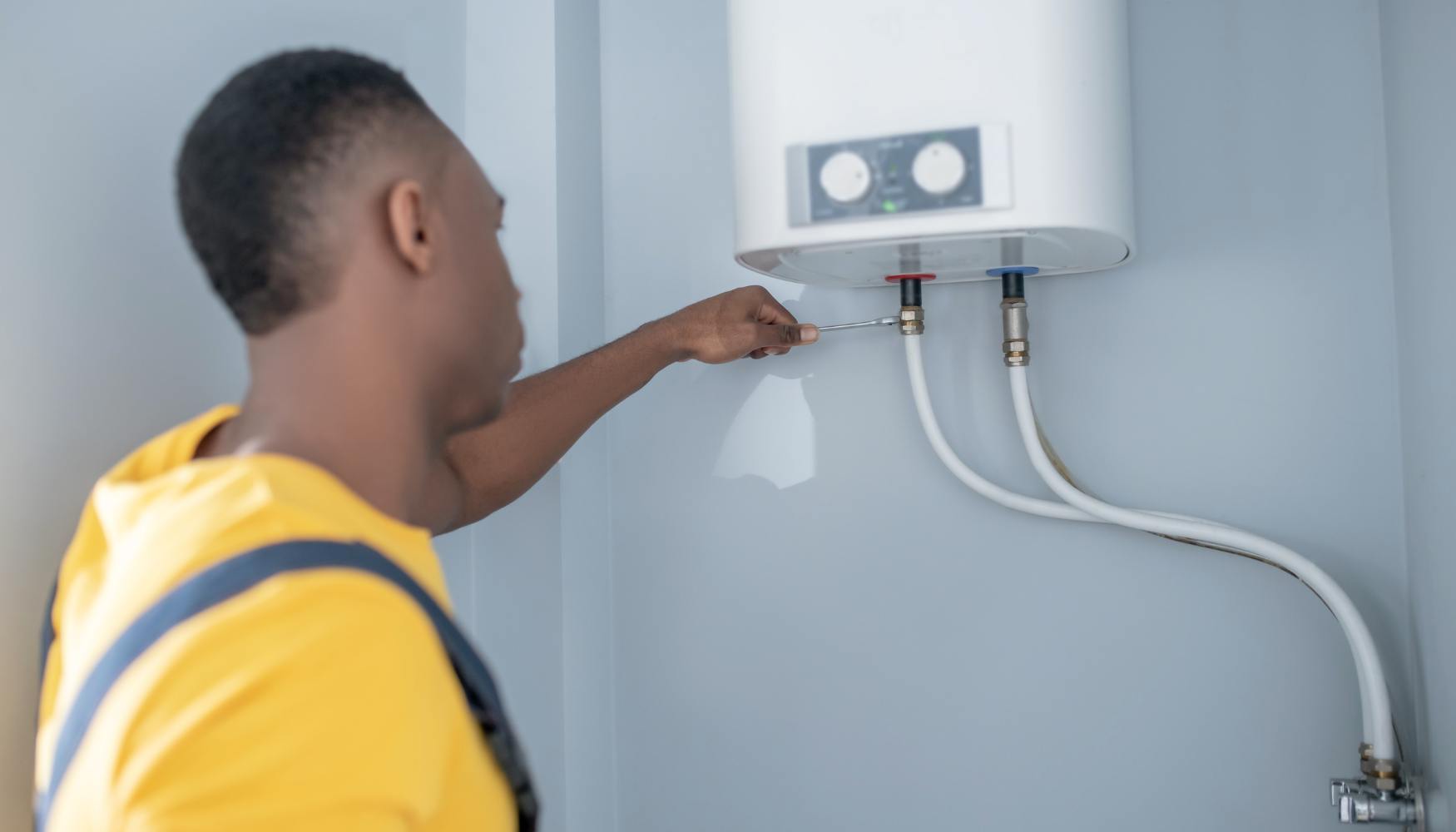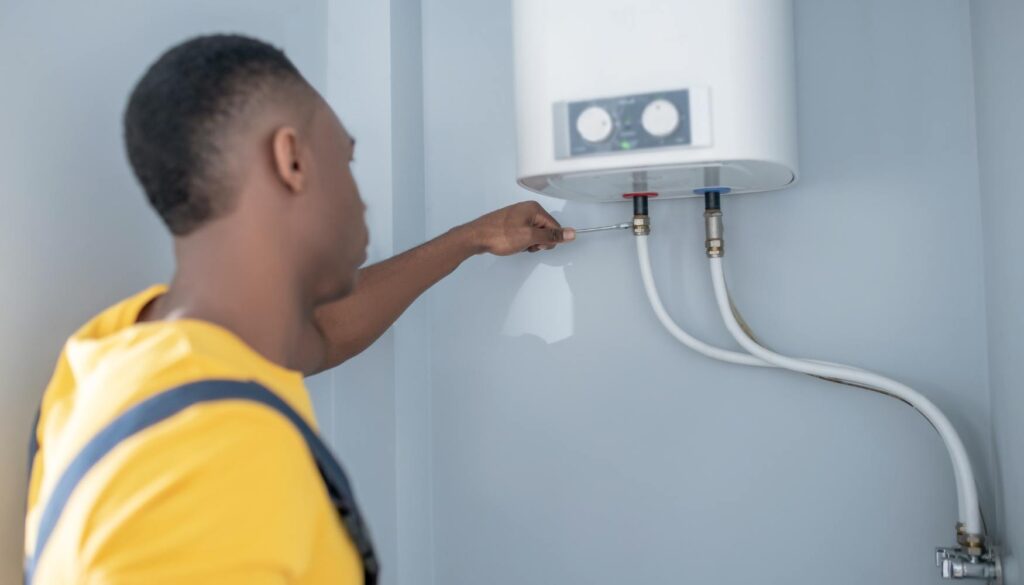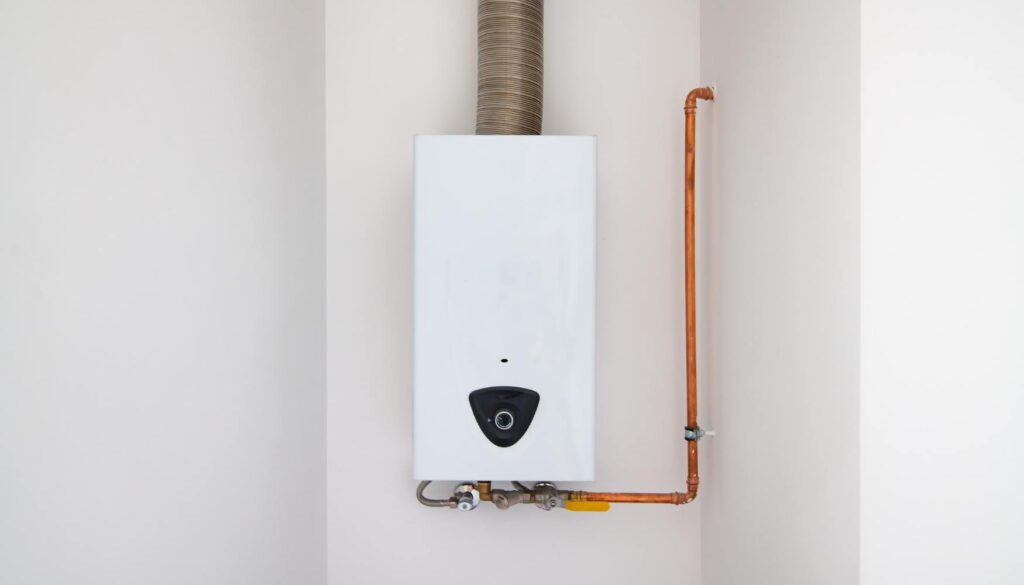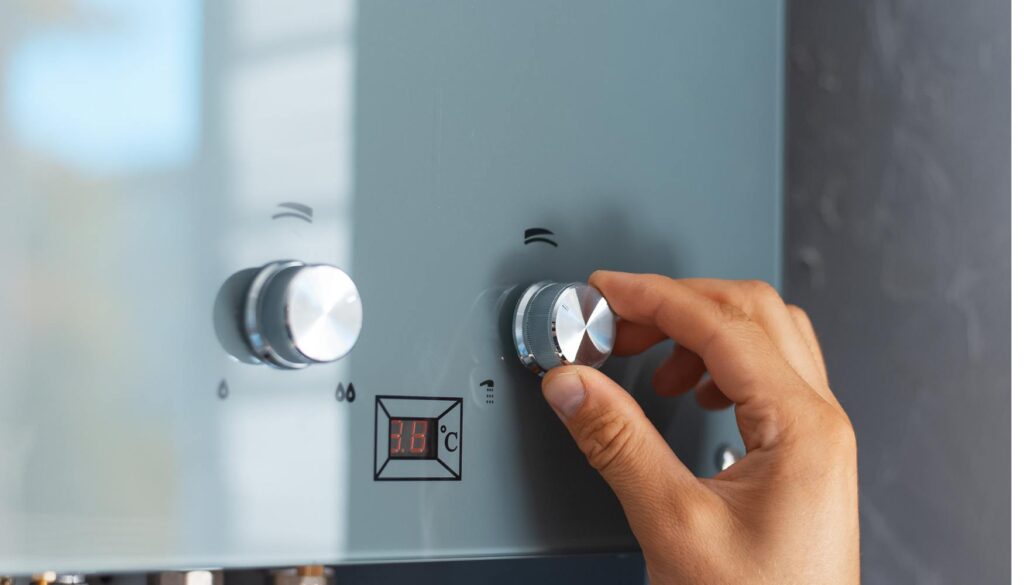
Imagine walking in from a long day of outdoor work. Your job requires that no matter the weather, you still work. And after a day of wet and cold temperatures, all you want is a hot shower.
Instead of walking in the door, turning on your shower, and then waiting 20 minutes (or more!) for your water to heat up to an ideal temperature, your tankless water heater has your shower hot and ready in seconds. By the time you’re undressed, your shower is waiting for you.
Considering making the switch? Learn how tankless water heaters work, the pros and cons of switching to a tankless water heater, and more.
Table of Contents
- What Is a Tankless Water Heater and How Do They Work?
- Pros and Cons of Tankless Water Heaters
- Installation Considerations for Tankless Water Heaters
- How Do Tankless Water Heaters Work? FAQs Regarding Tankless Water Heaters
- AAA Heating & Cooling: Providing Installation and Maintenance Services for Tankless Water Heaters in the Portland Area
What Is a Tankless Water Heater and How Do They Work?
Tankless water heaters only provide hot water as needed. You might also hear them referred to as “demand-type” or “instantaneous” water heaters.
These energy-saving and money-saving water tanks heat water instantaneously without the use of a water storage tank. When a hot water faucet is turned on, cold water begins to flow through the unit’s heat exchanger to heat up.
Sometimes, tankless water heaters are not big enough to support hot water for simultaneous or multiple usages through a home or building. For example, if your household tries to run the dishwasher, take a shower, and do laundry at the same time, a tankless water heater might be struggling to work.
Large households can still use tankless water heaters, though. Consider installing two or more tankless water heaters or a separate tankless water heater specifically for appliances.
The Difference Between a Tankless Water Heater and a Traditional Water Heater
The most obvious difference between a tankless water heater and a traditional water heater is that a tankless water heater has no storage tank while a traditional one does.
Some other differences include:
- Traditional water heaters hold water over long periods, causing the water to eventually lose heat. Tankless water heaters heat on demand.
- Traditional water heaters are large and take up lots of space. Tankless water heaters are much smaller and easily mounted to a wall.
- Traditional water heaters typically cost less to both purchase and install, but tankless water heaters have lower operating costs.
- Traditional water heaters typically last between 10-15 years. Tankless water heaters last around 20 years.
On the hunt for a water heater for your home? AAA Heating & Cooling can provide you with the right water heater for your and your family’s needs.
Pros and Cons of Tankless Water Heaters
4 Pros of Tankless Water Heaters
We get it — the higher initial cost of a tankless water heater might be enough to deter you from deciding to install a tankless water heater in your home.
Yes, tankless water heaters do cost more to purchase and install, but they require less maintenance than a traditional water heater and have a longer lifespan, making them worth the investment.
Additionally, these four major pros of tankless water heaters could help change your mind.
#1: They Use Less Energy
Tankless water heaters are energy efficient. According to the Environmental Protection Agency (EPA), tankless water heaters use up to 34% less energy than traditional water heaters if you use less than 41 gallons of hot water daily.
For homes that use closer to 86 gallons of hot water a day, tankless water heaters are around 14% more efficient.
#2: They Save Money
Yes, the initial cost of a tankless water heater is more than a traditional water heater, but they typically last longer, have lower operating costs, and have fewer maintenance requirements.
When compared to a traditional water heater, tankless water heaters can last 5-10 years longer and have easily replaceable parts that might extend their life expectancy even further.
With these smaller costs, a tankless water heater can easily offset the higher purchase price.
#3: They Qualify You for the Energy Star Tax Credit
Through 2032, federal income tax credits are available to homeowners that will allow up to $3,200 annually to lower the cost of energy-efficient home upgrades by up to 30%.
You can learn more about federal tax credits associated with energy-efficient upgrades here.
#4: They Have Potential To Provide ROI
Did you know that tankless water heaters cost between $75 and $300 a year to operate compared to traditional water heaters that cost between $175 and $500 a year?
If fuel costs continue to rise, making the switch to a tankless water heater could eventually offer a return on investment.
3 Cons of Tankless Water Heaters
Tankless water heaters do offer more good than bad, however, there are some minor flaws to consider when thinking of making the switch from a traditional water heater.
#1: Low Water Pressure Issues
Tankless water heaters might cause water pressure to begin to slow down. If you notice a drop in water pressure after having your tankless water heater installed, this could be why:
- The shut-off valve might be slightly closed.
- Sediment build-up on the screen.
- Attempting to use more gallons per minute (GPM) than your tankless water heater can handle.
#2: The Cold Water Sandwich
The cold water sandwich effect is common with tankless water heaters.
Some tankless water heaters require the call for hot water to last for at least three seconds before the burners turn on, so you might end up with layers of hot and cold water in the pipes.
When a faucet is turned on, off, and on again, there’s a slug of cold water interrupting your hot water flow, sending you spurts of cold water between your hot water.
#3: The Long Wait for Hot Water
Although tankless water heaters are designed to provide hot water on demand, there are a few reasons why you might notice it takes a minute for your water to get hot:
- The size and capacity of your water heater is too small.
- The distance between your water heater and the tap is too long.
- There is mineral build-up inside your water heater.
- Your water heater is gas-powered and the gas pressure is too low.
Installation Considerations for Tankless Water Heaters
Switching to a tankless water heater sounds appealing, right?
Unfortunately, not all homes are designed to handle the load of replacing a traditional water heater with a tankless one. Plus, the installation process is different.
Before purchasing and installing a tankless water heater, consider:
- The size of your home’s gas piping, gas meter, and gas line to the meter. These need to be sized appropriately to handle the high gas load that will be replacing your traditional water heater.
- Double-checking the power needed to operate and exhaust a tankless water heater.
Overwhelmed by all the information? That’s okay. Instead of stressing over the right choice, consider contacting AAA Heating & Cooling, the experts in all things heating and cooling. We’re also available for the installation and maintenance of tankless water heaters.
How Do Tankless Water Heaters Work? FAQs Regarding Tankless Water Heaters
Are Tankless Water Heaters Safe?
When compared to traditional water heaters, choosing a tankless water heater is a safer option.
Traditional water heaters need to hold large amounts of superheated water which can pose a threat to small children, pets, or anyone around. To prevent scalding, the hot water inside of a traditional water heater tank needs to be tempered with cold water.
Tankless water heaters are pre-set to a temperature of your choosing without the need to add cold water. The option for different heat settings makes tankless water heaters a safer choice.
Traditional water heaters may also pose the risk of Legionnaires’ disease — a severe form of pneumonia that affects the lungs. How? The ideal temperature for bacteria to grow is between 95-131 ℉ — the same average temperature as the water inside of a traditional water heater.
With a tankless water heater, you eliminate the need to store water at a high temperature, minimizing the risk of Legionnaires’ disease.
Are Tankless Water Heaters More Efficient?
Overall, yes.
Although we know that tankless water heaters cost more upfront, they:
- Are energy efficient
- Are lower maintenance
- Have lower operating costs
- Heat water on-demand
- Take up less space
- Are safer
Are Tankless Water Heaters Gas or Electric?
Tankless water heaters can be either gas or electric. If they’re gas, a natural gas burner heats the water. If they’re electric, an electric element heats the water.
Is one better than the other?
Gas Tankless Water Heaters
Gas tankless water heaters are known for being more efficient because they provide a more constant hot water supply. They are more cost-effective because they convert energy to heat more efficiently.
However, gas tankless water heaters require a gas line for installation and venting for the exhaust, so they could be more complex to install.
Electric Tankless Water Heaters
Electric tankless water heaters are great for those with lower hot water demands. They are also less expensive compared to gas tankless water heaters.
Conversely, electric water heaters have lower efficiency, so they could struggle to keep up with larger or multiple appliances. They also have lower flow rates.
How Long Do Tankless Water Heaters Last?
Generally, tankless water heaters last close to 20 years with proper maintenance. There are also options to easily purchase parts for tankless water heaters to help extend their lifetime past the 20-year mark.
AAA Heating & Cooling: Providing Installation and Maintenance Services for Tankless Water Heaters in the Portland Area
The switch from a traditional water heater to a tankless water heater is enticing, but you’re unsure who to turn to for help.
AAA Heating & Cooling is Portland’s choice for all heating and cooling needs, including tankless water heaters.
Not only can our expert team answer any questions you have regarding tankless water heaters, but we can help you choose the best option for your home, take care of the installation process, and provide regular maintenance to your system.
Contact us today for help.



